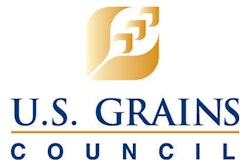U.S. trade negotiators should make every effort to do no harm to U.S. agriculture when modernizing the North American Free Trade Agreement (NAFTA) and should proceed quickly to help allay uncertainty felt by both customers and U.S. grain producers, USGC Chairman Chip Councell testified this week before a panel assembled by the Office of the U.S. Trade Representative (USTR).
| USGC Chairman Chip Councell, Maryland |
Councell, who farms on the Eastern Shore of Maryland, told members of the panel and public closely following the three-day series of NAFTA hearings that concerns about the stability of the agreement have disrupted relationships with longstanding customers and sparked significant unease in farm country, even though the renegotiation process is just beginning.
He said the Council has "strong but unconfirmed evidence" Mexico will purchase corn from South America later this year, and that he himself took a futures position for his 2017 corn crop when withdrawal talk began, fearing what might happen to markets as the new crop approached.
"What is happening now in our relationship with Mexican buyers will change how the Mexican industry invests in infrastructure, impact our demand for years to come and impact individual producers like myself financially," he said.
Councell described the intense engagement USGC has had with Mexican customers since the first of the year, recounting his two recent trips to the country, with USGC President and CEO Tom Sleight and with the full USGC Board of Directors, and sharing lessons learned from the teams of Mexican grain buyers and Mexican brewing industry members that visited the United States this spring. He reported concerns from buyers like these have translated directly into lost dollars for U.S. farmers.
"Because our agriculture economies have grown to be so closely intertwined, this trade agreement in particular is critical to my business,” he said. “The last several months have highlighted how important it is to maintain this strong, stable relationship if we are going to continue to grow.”
Close geographic proximity and logistical advantages, coupled with the tariff-free terms in NAFTA, have created new opportunities for U.S. feed grains and co-products exports, particularly to Mexico.
Mexico is the largest export market for U.S. corn, purchasing 13.3 million metric tons (524.4 million bushels) worth $2.5 billion last marketing year, in addition to 606,127 tons (23.86 million bushels) of sorghum, 115,000 tons (5.3 million bushels) of barley and 1.9 million tons of distillers dried grains with solubles (DDGS).
Mexican buyers welcome these imports because U.S. feed grains provide a reliable supply of valuable nutrition for Mexico’s growing livestock, dairy and poultry sectors. USGC’s work in Mexico over the last 30 years has helped these businesses expand their operations, while also expanding the use of U.S. grain products throughout Mexico.
| View a larger version of this chart here. |
Canada is also a dominant buyer of U.S. feed grains and value-added products, coming in as the ninth largest export customer for U.S. corn last marketing year (980,000 metric tons or 38.6 million bushels); the second largest export customer for U.S. barley (34,000 metric tons or 1.6 million bushels); and the top export customer for U.S. ethanol (234.9 million gallons).
Councell reiterated that USGC’s top priority during the NAFTA renegotiation process is to maintain this market access and keep this demand in place. However, Councell did acknowledge areas where NAFTA could be improved, including updated sanitary and phytosanitary regulations, biotechnology synchronization, energy provisions and other elements included in the Trans-Pacific Partnership (TPP) text.
"The U.S. grains sector has seen enormous gains from more liberalized trade in the past 30 years, and in no case has this been more apparent than in our trade relationship with Canada and Mexico," Councell said. "NAFTA has provided the trade policy underpinnings for the most efficient and effective interregional grain and livestock value chain in the world."
Read Councell's full written testimony here. Recorded webcasts of the three days of testimony will be archived here.

















